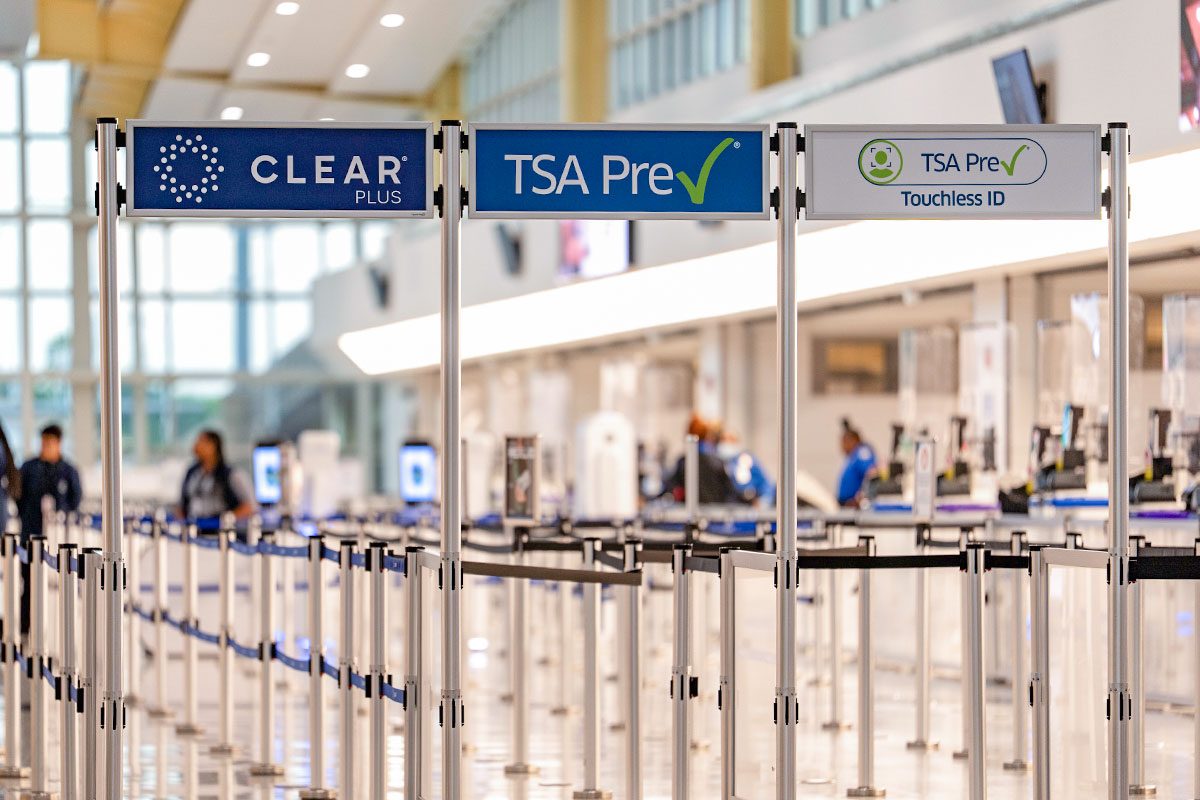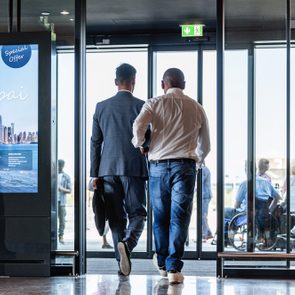Security-checkpoint scanners could flag you for something you can't pack—or even prevent

Find Out the Surprising Reason You Might Get Stopped at TSA This Summer—And What to Do About It

Getting through airport security is just a bit easier (and hopefully somewhat faster) now that the rule about removing shoes at checkpoints has been lifted. Most travelers know the drill for the current process: You must toss all oversized liquids, place your laptop and phone in the bin, and step through the scanner when the agent gives you the go-ahead. Still, even travel pros who faithfully follow every rule could still trigger security alarms for a reason that’s pretty difficult to control—and it’s definitely one most people likely don’t even realize could be a problem.
Going through security can be a stressful part of travel, so you’ll definitely want to find out what surprising factor could set off literal alarm bells. Read on for the details before your next flight so you’re not caught off guard if it happens to you.
Get Reader’s Digest’s Read Up newsletter for more travel news, tech, cleaning, humor and fun facts all week long.
What’s the surprising thing that might get you stopped at TSA?

An extra-hot day or that anxiety-inducing dash to make your flight may have you perspiring—and believe it or not, that sweat could lead to some unexpected extra scrutiny at security. The TSA recently confirmed this on Threads, stating, “We’ve had a couple of questions about ‘swamp crotch’ and while that’s probably not the term we would have chosen … we can confirm that sweat can cause alarms on the body scanners.”
Why could sweat set off body scanners?
Jeffrey Price, former assistant director of security at Denver International Airport and lead author of the textbook Practical Aviation Security: Predicting and Preventing Future Threats, explains that airports in the United States use millimeter wave body scanners, which rely on radio waves to scan the surface of passengers’ bodies and create a 3D image to detect anything not part of the human anatomy. “Sweat is mostly water, which absorbs millimeter waves differently than dry skin or fabric,” he says. “These differences in absorption, plus sweat causing clothing to cling to the skin, can appear as ‘foreign objects’ to the scanner.”
Sweat can also pool on the body, especially in areas like the underarms, waist or lower back, creating glossy or uneven reflective surfaces on skin or clothing. That can confuse the scanner, Price says, and potentially cause it to “see” the sweat as an irregular texture worth flagging.
So, yes, something as harmless as sweat can actually appear to be a legitimate threat that warrants further investigation by TSA agents.
How much sweat is too much sweat?
It’s hard to say how much sweat could trigger alarms. “There is not an exact threshold of how much perspiration can set off the machine,” Price says. “But if you’ve been running through the airport on a hot day, you’ve probably got a better than average chance of setting off the machine.”
What happens if sweat sets off the body scanner?
The good news about this sticky situation is that if you’re flagged because of sweat, it likely won’t result in more than a quick extra inspection. “A passenger may have to undergo a pat-down or have the area tested for explosive trace detection (ETD), as officers are trained to recognize false alarms—including those caused by sweat, bulky clothing or medical conditions,” Price says.
How can you avoid setting off the body scanner?
Unfortunately, there’s not a lot you can do to completely prevent it, but the good news is that the sweat-triggered false alarms are becoming less common. “Most machines have improved over time to reduce the chances of sweat setting them off,” Price says.
He recommends that if passengers really don’t want to be singled out, they could try wearing breathable, moisture-wicking fabrics or loose clothing. “But honestly,” he adds, “the amount of time this occurs is probably not enough to worry about it, especially when a simple pat-down solves most of the problems.”
What else might set off a body scanner?
In addition to sweat, Price says that there are other common culprits that could set off alarms on millimeter wave body scanners. Some are items passengers can easily remove, like heavy jewelry and metallic or thick-soled shoes (especially hiking boots). Others, however, aren’t so easy to avoid. “Thick or curly hair (especially when combined with styling products or hidden clips), external medical devices such as ports, insulin pumps or ostomy bags, layered sanitary products, and folded waistbands (particularly when adjusted after sweating) can all trigger body-scanner alarms by creating unusual shapes or textures that the system may misinterpret as potential threats,” he explains.
His best advice? Get to the airport in advance, and be patient. “Everyone has someplace to go, and they all just want to get there without problems,” Price says.
RELATED:
- New Study: If You Fly Out of This Airport, Be Prepared to Wait Around 50 Extra Minutes Before Takeoff
- You’re Spending a Lot More at the Airport Than You Think—Here’s How Much
- The New Gen Z Travel Trend You Won’t Want to See at the Airport
About the expert
|
Why trust us
Reader’s Digest has published hundreds of travel stories that help readers explore the world safely, easily and affordably. We regularly cover topics such as the best places to visit (and the best times to visit them), tips and tricks to zoom through airport security, flight-attendant secrets, hotel-room hacks and more. We’re committed to producing high-quality content by writers with expertise and experience in their field in consultation with relevant, qualified experts. We rely on reputable primary sources, including government and professional organizations and academic institutions as well as our writers’ personal experiences where appropriate. We verify all facts and data, back them with credible sourcing and revisit them over time to ensure they remain accurate and up to date. Read more about our team, our contributors and our editorial policies.
Sources:
- Threads.com/@TSA
- Jeffrey Price, former assistant director of security at Denver International Airport, author of Practical Aviation Security: Predicting and Preventing Future Threats and professor at the Metropolitan State University of Denver; email interview, July 2025























